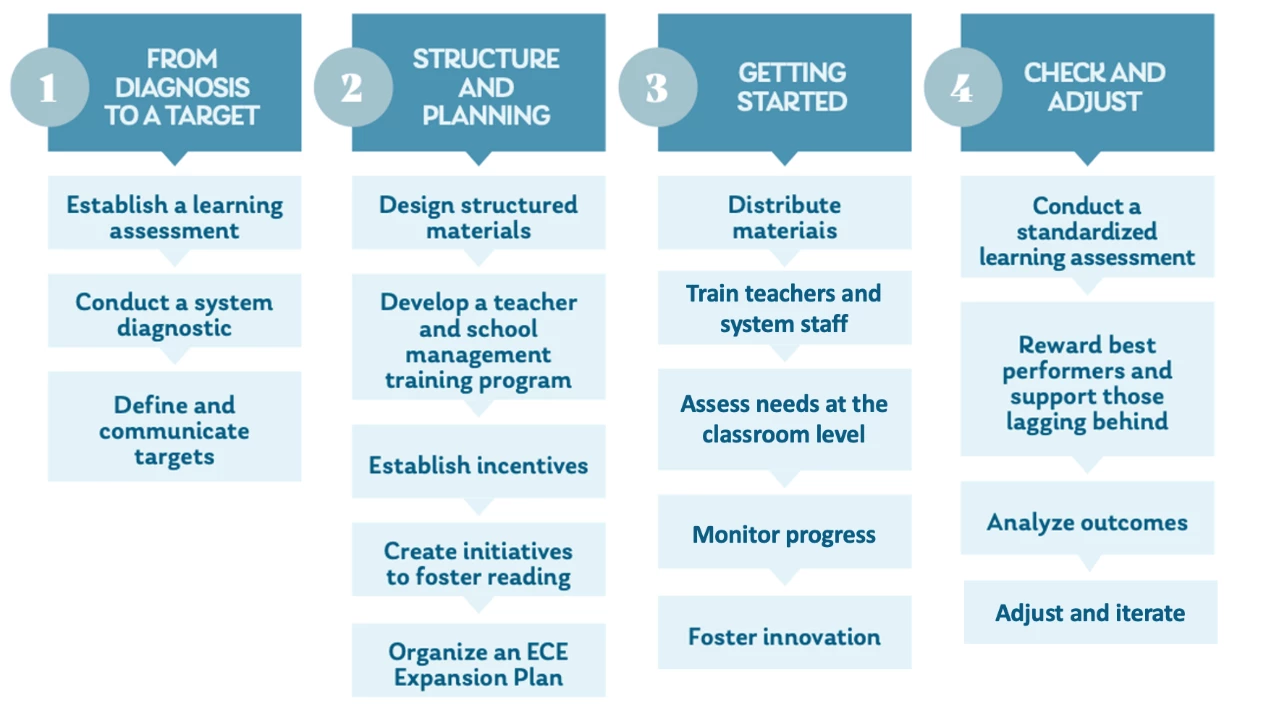 Education policy reforms in Sobral, Brazil led to rapid improvements in literacy. Copyright: Shutterstock
Education policy reforms in Sobral, Brazil led to rapid improvements in literacy. Copyright: Shutterstock
Teachers matter more for student learning than any other aspect of schooling. From Ecuador to India, the effect of switching from a low-performing to a high-performing teacher is equivalent to gaining up to four years of typical schooling progress.
Thanks to countless studies and evidence reviews on how to improve learning, we have a better understanding of what high-performing teachers do, and which policies help them succeed. Yet those policies are not being designed and implemented to facilitate the changes needed at the classroom level: 70 percent of children in low- and middle-income countries still cannot read and understand a short passage of age-appropriate text by age 10.
The World Bank’s report Making Teacher Policy Work explores the reasons behind the persistent absence of high-quality teaching in all classrooms around the world, despite mounting evidence on effective teaching practices (the skills and strategies teachers use) and teacher policies (the rules that govern teachers in a system). A central argument is that policymakers should focus on practical support that address barriers faced by teachers to implement effective strategies in the classroom.
The city of Sobral, Brazil, exemplifies successful educational transformation via iterative policy changes that make effective teacher practices clear, doable, and rewarding for teachers. These reforms proved effective and were later scaled to the whole state of Ceará using a results-based finance mechanism: no state in Brazil has seen school results rise so fast, despite Ceará being one of the country’s poorest.
A previous blog highlighted how policymakers in Sobral and Ceará tackled the system-level barriers to scalable and sustained change. This blog highlights three insights into how policies achieved teacher effectiveness.
From 1,366th to 1st: Climbing the education rankings
In 2001, 40 percent of grade 3 students in Sobral could not read a simple word. To improve literacy, authorities initiated a series of reforms based on an iterative adaptation approach that resulted in a transformation of daily classroom practices for teachers (see Figure 1 and this case study for details).
Policy reforms included a revised teacher career scheme, revamped teacher training focused on practical pedagogy for teaching literacy, providing high-quality instructional materials, and the regular use of learning assessments to improve teaching as well as accountability for learning outcomes. In twelve years, Sobral went from being ranked 1,366 to first among Brazil’s municipalities in the national index for education quality for both primary and lower secondary education, and inspired a similar educational transformation in the State of Ceará. We can draw three insights from this remarkable experience.

Implementation Roadmap Stages adjusted from Loureiro et al 2021.
1. Policies are more likely to succeed when teachers have a voice in shaping them
Teachers should have a say in shaping the policies that govern their profession. Adopting a behavioral science perspective can help policymakers understand the daily challenges teachers face in classrooms and address constraints that prevent them from embracing changes. Establishing feedback loops and iterating to solve problems is key.
In Sobral, each reform was designed and implemented to support actors within the education system—including school leaders, pedagogical leaders, and especially teachers—to change how they perform their responsibilities to deliver high-quality teaching to students. Regular check-in meetings throughout the semester provided a collaborative space for key actors to co-create solutions, removing any obstacles hindering learning progress at each iteration.
Teachers and principals in Sobral were provided with a high degree of autonomy – but they were also held to account for learning. High-performing teachers were recognized and promoted to help in the selection and training of new teachers and pedagogical coordinators, while non-performing teachers and principals were removed if they did not improve.
2. At the individual level, changes should be clear, doable, and rewarding
Drawing on insights from behavioral science, we know that the most common barriers to change are uncertainty about expectations, translating knowledge into action, and a lack of motivation. Put differently, knowing what to do, how to do it, and why. In Sobral, teachers were provided with clear expectations and equipped with tools to meet them. First, leaders set an ambitious literacy target that was easy to understand: all students should learn to read and understand a short age-appropriate text by the end of second grade. Significant time was dedicated to reading instruction, guided by an established learning sequence of the reading competencies students needed to master, with clear goal posts for teachers. To help teachers meet expectations, they received structured lesson plans, monthly professional development, and feedback from regular classroom observations. In addition, the local government introduced bonus payments to reward teachers and principals who helped their students meet learning goals, thereby providing extra motivation for them to help every student succeed.
3. At the system level, data is critical to improve teaching, learning and accountability
Data is a powerful tool to guide change efforts. It can help ensure policies to improve teaching and learning are operationally and politically feasible to implement at scale and over time. Without data, it is difficult to set targets and target resources.
In Sobral, learning data has been used to inform teacher professional development, guide the development of teaching and learning materials, and provide additional support to students who need it. It has also been used to reward good performance, allocate resources, improve accountability, and align everyone in the system toward the goal of learning.
At the municipal level, diagnostic learning assessments in the early grades are conducted twice yearly to monitor student acquisition of foundational literacy and numeracy skills. The results inform school strategies to help students falling behind grade-level learning goals to achieve them. At the state-level, yearly large-scale assessments are used to incentivize high-performing schools and allocate resources and technical support to low-performing schools through a results-based funding scheme. Finally, biannual national assessments help promote accountability by ranking schools according to quality. When Sobral started to show great progress, it helped shore up political support for the reform efforts.
Successful teachers, successful students
The World Bank's report on teacher policy emphasizes the pivotal role of teachers in shaping effective education policies. It urges policymakers to move beyond “what works” to focus on removing individual and system-level barriers to effective teacher policy, through active teacher involvement, practical support, and using data to guide action and behavioral insights to boost the effectiveness of policies. By prioritizing these factors with an unwavering political commitment to education reforms, like Sobral has done, education systems will have a strong basis on which to build an effective teaching profession focused on student learning.
To learn more:
· Read the Making Teacher Policy Work report.
· Watch the report launch event.
· For a quick introduction to the report, check out the two-pager, also available in Arabic, French, Portuguese, and Spanish.
· For more on the World Bank’s strategy on teachers, see “Successful Teachers, Successful Students: Recruiting and Supporting Society’s Most Crucial Profession”
· To learn more about the World Bank’s Teach program to measure effective teaching practices through classroom observation, see the Teach briefs and tools.
· To learn more about the World Bank’s Coach program to improve in-service teacher professional development, visit the Coach website, take a look at the Coach tools and resources.
· To Learn more about Sobral and Ceará, see this blog, this and this reports, and video interviews with a school leader and the Secretary of Education.



Join the Conversation